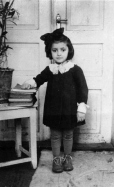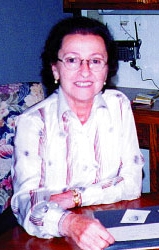|
Wojewodztwo Historical Commission
Bialystok, 22 October 1945
L.B. -- 86
My Experiences During The German Occupation
Told by Chana Finkielsztejn, a student of the Bialystoker Yiddish School. Born in the year 1933 in Radzilowa.
Saved by farmers in the area. Reported by her.
On the 22nd of June, 1941, the war broke out
between Russia and Germany. Immediately the destruction began. The Jews from the
surrounding shtetlach started to flee, from Wasosz and from Szczuczyn, and a
hush fell upon all the Jews.
|
|
|
|

|
|
Chana Finkelstein (Ann Walters)
as a child in Radzilow, Poland, 1937-38.
She was seven years old at the time
of the massacre in Radzilow in 1941. |
|
| |
|
When the Germans arrived, the Jewish destruction erupted. Quickly there
followed the torturing of the Jews. As soon as the Germans marched into the
shtetl, the Polaks asked the Germans what would be the consequence of killing a
Jew. The Germans answered that nothing would happen.
|
|
|
|

|
|
Ann Walters |
|
|
| |
|
Immediately the Polaks started pogroms. At night they attacked the Jewish
homes. They dragged Jewish men out of their houses and beat them until they fell
unconscious. So it was night after night. Afterwards, they brought people to the
river and tortured them there.
Later they took out the Sidurim from the Beis Hamedrash along the way, and
they collected the old Jews so that they should carry these to the river and
throw them in. They forced the Jews, who carried everything on their own
shoulders and took them to the river. They pulled old Jews by their beards and
cut out half of their beards, making caricatures of them and beating them if
they scowled.
On the 24th of June, a Friday night, Germans passed through and stopped in
the shtetl. The Polaks gathered around. They lead them to think that rich people
lived here. The Germans came to us and said they needed certain things which we
were unable to give them. So they began beating and robbing people.
My father began to run away. The Germans started to chase him and shoot at
him. My father managed to escape, but the Germans busied themselves with us.
They beat us severely. My mother tried to protect us and suffered a terrible
beating; she had scars and wounds her whole life because she had tried to
protect us. Just as the Germans had left, the Polaks began to break windows.
On the 7th of July many Germans arrived. The Germans assembled all the Jews
in the market place and they said to the Polaks: Here you have the Jews. Do with
them whatever you wish. The Germans drove away immediately. The Polaks began to
torture the Jews terribly.
One Christian approached my father and said, "Take your family and go into
your house." Afterwards, they lined up the Jews in foursomes and led them away.
We sat in our house. We thought that since we had been released from the
market place, we would not be harmed. But this did not last long. Soon other men
came for us. They chased us out of our house and led us toward the other Jews.
We were perhaps a hundred meters from the barn when we heard a shot and saw
smoke. We skirted the barn with the Jews. The Gentiles released us. Then we ran
away to hide in the woods.
The screams of the people were terrifying; the earth was almost trembling;
and the smoke from the burnt corpses spread throughout the woods. We were
sitting in a hole near the chassis, and a horseman was riding around looking for
us. Soon a wagon came along; it stopped and the driver asked the horseman
whether he had seen us. We had witnessed the destruction.
We headed toward a village. When we arrived there, we were allowed to spend
the night in a barn. In the morning a peasant came and told us he was afraid to
let us stay there any longer and asked us to go beyond the village into the
woods. We remained in that village until the 2nd of November, 1942.
On the 2nd of November, the "soltis"?
of the village came with a wagon and
said that we should get into the wagon and leave with him. He wanted to capture
us and take us to the Gestapo. We all ran away in different directions. I and my
little brother went to another village four kilometers away from this village.
For four days we remained in that village. Later we hid in a barn under
terrible circumstances/conditions, suffering from hunger, cold,
dirt, and every minute looking death in the eyes. During this time
we changed our location twelve times.
Chana Finkielsztejn
Student
Bialystok, 22 October 1945
Testimony recorded by Kaz. Kagan, protokolant
Signature D. Kaga(?), Chairman of the Wojewodztwo Historical Commission
Signature Unknown
(The last two paragraphs have proven very difficult to
read, and different translators have produced quite different interpretations.
If you know Yiddish and would like to help me out with this, please contact me.)
|